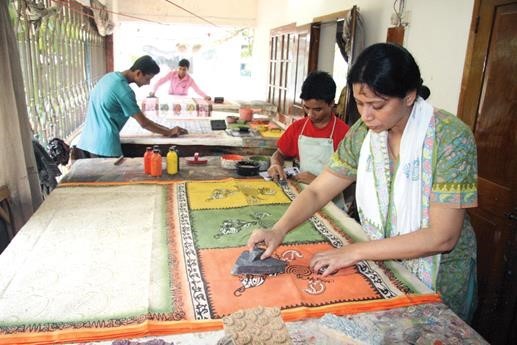
Entrepreneurs and experts on Tuesday urged the government to develop a new mechanism for lending low-cost bailout packages among small and medium enterprises (SMEs) as the traditional banking system has failed to cater to unbanked small enterprises.
They made the observations at a virtual dialogue, titled “Covid-19 Economic Crisis and SMEs of Bangladesh”.
The event was organized by Business Initiative Leading Development (BUILD), a research organization of the Dhaka Chamber of Commerce and Industry (DCCI).
“Even after two months have elapsed since the government announced a Tk20,000 crore stimulus package for the SME sector , most entrepreneurs are yet to benefit from the bailout,” said Rashedul Karim Munna, managing director of Creation BD, a jute diversified goods producer.
"We should think about the entrepreneurs who cannot avail banking channels. We should develop a new model so that we can reach entrepreneurs at union levels, those who have never borrowed from banks”, added the entrepreneur.
However, business people also called for separate guidelines for small entrepreneurs to ensure their access to finance.
“There are wide differences between small and medium enterprises in terms of business scale as well as in the definition of SMEs. And if the rules are the same for both small and medium entrepreneurs with regard to a disbursal of stimulus funds, small entrepreneurs will be deprived of the package,” said Nihad Kabir, President of the Metropolitan Chamber of Commerce and Industry (MCCI).
"We have to think out of the box. If we think that Covid-19 will disappear by January, it will be a wrong assumption," she cautioned.
For the effectiveness of the package, the business leader suggested continuing financial support to affected businesses for the next two to three years.
On top of that, the traditional rules and guidelines to obtain bank loans were rigid for the SMEs, she added.
“Some of the conditions in the traditional lending system are very stringent for SMEs, especially for those who are not under the fold of the banking system. For ensuring access to credit, there is a need to frame a separate policy and credit guarantee scheme for these unbanked small entrepreneurs,” said Ferdaus Ara Begum, CEO of BUILD.
Participants urged the government to engage micro financing institutes and non-banking financial institutions in disbursing SME stimulus funds properly.
Traceability of SMEs a problem
Tracing the affected enterprises or SME entrepreneurs remains a big problem. Stakeholders at the programme called for a central database where there would be available information about the sector.
In response to the concern, Industries Minister Nurul Majid Mahmud Humayun urged the SME Foundation to prepare a comprehensive database for the country's cottage, micro, small and medium enterprises (CMSME) sector.
He hoped a complete database would help in a smooth disbursement of stimulus funds among the affected CMSMEs.
Terming the SMEs as the lifeline of the economy, the minister emphasized coordinated efforts for framing a long-term plan to help create new employment opportunities, ensure SME product diversification, enforce strong monitoring on loan disbursement, safeguard health issues and tackle risks of job losses amid the Covid-19 pandemic.
Unemployment big threat for the country
"We have to recognize the sector's contributions to the economy as well as towards employment. As of now, 86% employment in the economy comes from the MSMEs sector. The engine of economic growth is now at a risk of losing its business and the jobs of thousands of people ," said Monzur Hossain, senior research fellow at the Bangladesh Institute of Development Studies (BIDS.)
Should the government fail to save the sector within the shortest possible time with proper support, the economy would fall into a long term recession and unemployment would rise sharply, he feared.
The government had offered a timely package, but its implementation process was flawed, as a good number of entrepreneurs did not have access to the funds, he added.
The Covid-19 pandemic came at a time when business expansion in Bangladesh was going ahead very swiftly. Now the expansion of business as a whole and the SMEs in particular remained halted due to the disruption of production caused by the prolonged countrywide shutdown, said Md Safiqul Islam, managing director of SME Foundation.
This crisis could cause a workforce layoff in the SME sector, creating the scope of a threat for the country's economy, he added.
Expand local market for survival
"We have to take measures to expand and develop the local market for survival. In addition, the government should discourage import of goods that are being produced locally by increasing import duty," said Creation BD owner Rashedul Karim.
Besides, the government should keep quota provisions in its procurement policy for the SME sector, which would ensure a linkage between the supply chain and big industries, he added.
52% SMEs shut operation
Referring to a survey conducted by Light Castle Partners, BUILD claimed in its presentation that about 52% of SMEs had closed their operations countrywide because of the disruption of the supply chain, unavailability of raw materials and lack of scope to sell their products.
Due to the shutdown, most small businesses were at a standstill for more than two months, struggling to pay salaries to their staff and bear other related costs, the research organization said.
They, however, could not provide details on the data of the closed factories, their locations and business categories.
Entrepreneurs lost the summer market along with the Bangla New Year and Eid-ul-Fitr market for which they had invested a lot of money.
On the other hand, the services industry took a heavy hit as they had been unable to sell their services and generate revenue to sustain themselves. Entrepreneurs involved with boutiques, restaurants and beauty parlors were still counting huge losses due to the corona-related assault on the economy, it added.
Source: https://www.dhakatribune.com/business/economy/2020/06/23/52-smes-close-operation-due-to-supply-chain-disruption-caused-by-covid-19

